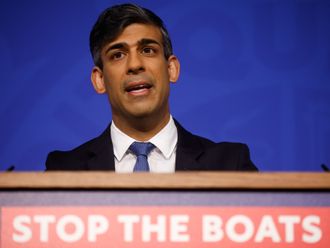London: Following the recent spate of terrorist attacks in Britain, Prime Minster Theresa May was quick to blame internet giants such as Facebook and Google for giving extremists “safe space to breed”, and accused them of not doing enough to prevent British Muslims from being radicalised online.
Experts are not convinced, however, that tighter regulations on social media would have prevented the attacks in Manchester and on London Bridge.
Instead, it is argued the face-to-face radicalisation of jailed hate preacher Anjem Choudary and his Al Muhajiroun network is far more likely to be responsible for radicalising Britain’s home-grown terrorists.
“What he [Choudary] offered was a sense of community, belonging, and camaraderie within a circle of peers. This builds strong interpersonal bonds based on what has been called ‘in-group love’,” Dr Shiraz Maher and Professor Peter Neumann, of the International Centre for the Study of Radicalisation, told the BBC.
“The internet plays an important role in terms of disseminating information and building the brand of organisations such as [Daesh], but it is rarely sufficient in replacing the potency and charm of a real-world recruiter.
“Perhaps more than any other radical cluster, the network around Choudary has been linked to scores of attacks, both at home and abroad, and dozens of foreign fighters joining [Daesh] in Syria.
“It is one thing for the internet companies to pull down radical propaganda. But they face an uphill battle while preachers such as Choudary have spent years spreading their message virtually unchallenged on British streets.”
Psychiatrist Kamran Ahmad, meanwhile, believes a sense of detachment is a key factor in the radicalisation of young people such as Manchester bomber Salman Abedi.
“Those who find themselves at odds with the culture of their parents, and yet are met with hostility from the culture of the society they live in, embracing a third culture that provides them with a sense of belonging may be an appealing option. In this case, their minds become fertile ground for radicalisation,” he wrote in The Guardian.
“This is akin to the pathway into gang culture for young people around the world — a sense of alienation from family and society at large delivers them into the hands of older gang leaders. The counterculture for young Muslim men at odds with society nowadays is not gang culture but radical extremist factions that offer self-esteem and identity in exchange for allegiance to a violent and morally bankrupt manifesto. “Once they are members of the subversive peer group, alarming ideas and behaviours can become normalised very quickly indeed.”
The writer is a freelance journalist based in the UK.












